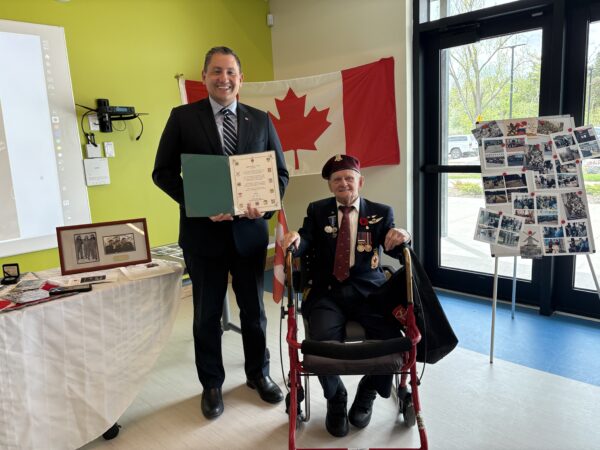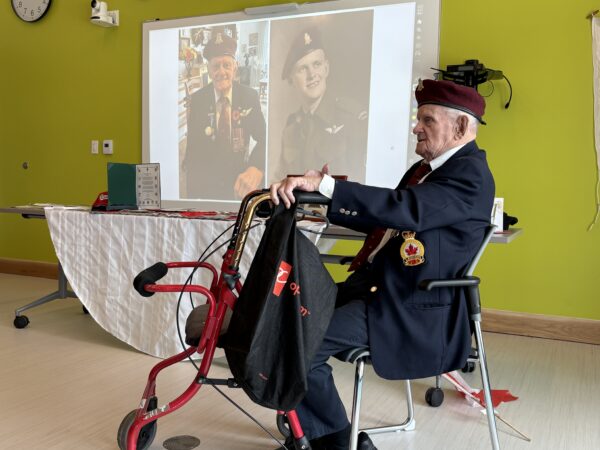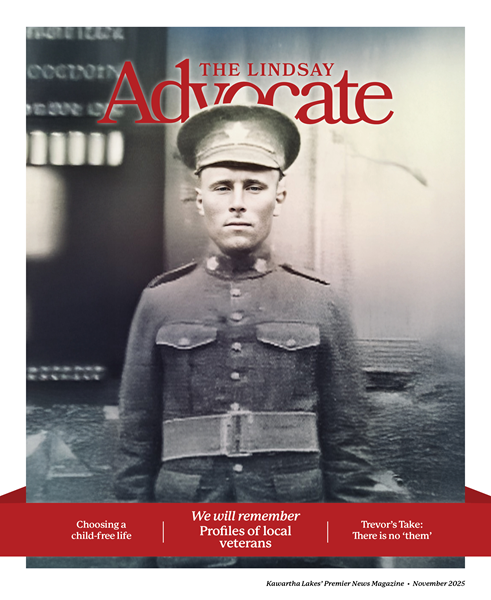WWII veteran Ernie Wiles, 99, commemorated for his service

Ernest “Ernie” Wiles was 18 when his feet landed on the ground during Operation Market Garden in September 1944. The objective of this mission was for the Allies to land from the sky and secure key bridges in order to advance into Germany, where the hope was to be able to liberate the Netherlands.
Eighty years later Wiles, now 99, reflects on his time serving for Canada. Over 1,000 paratroopers went into Holland, Belgium and France to get to German-occupied territories, “we all parachuted in and chased them out of there and did what we had to do,” he said.
Wiles was recently selected as a Canadian Delegate by Veterans Affairs for the 80th anniversary of the liberation of the Netherlands.
Local MP Jamie Schmale presented Wiles with the honour and has a personal connection to the work the paratroopers did – his family is from the Netherlands. “If it wasn’t for the brave people like Ernie and the millions of other soldiers from across the allied forces that came together to fight for freedom, democracy, the rule of law, my father wouldn’t have been born (and) they wouldn’t have made the trip over to Canada for new opportunities,” he said.
Schmale noted how much the world has changed since the days of the war, and the courage it took those fighting to enlist. “It’s pretty remarkable that you all stepped forward.”
Wiles says that while it is an honour to be receiving this, “there were other paratroopers besides me, there were thousands of us.” Like many young men at the time, the Omemee native dropped out of school in order to enlist in the war, wanting to serve his country.

Back then, the men serving got to pick where they wanted to go, whether it be tanks, flying or paratrooping, for example. For Wiles, he wasn’t sure what he wanted to do, so when he was picking his role, “I stood up and said paratrooper.” The rest is history.
He said they would give men like Wiles a brief period of time to go home and think about it, however he was set on going. “They called my mama. She cried and said, ‘I don’t want you to go’, but we had to go,” he said, getting emotional at the memory.
Once he was shipped off Wiles did several jumps. Members of the paratroopers were awarded rings to show the amount of jumps they had made. Wiles made 17 during his service.
In every plane, there was a jump master. This person would be the one to open the door of the plane and made sure everyone would stand up. From there the men inside the planes would walk in twos to the doors where they would then jump. If you didn’t leap out “the jump master would just shove you out the door,” Wiles said.
After the war, many soldiers returned home but Wiles wasn’t one of them. “They needed people to stay and gather up all our equipment because we were going to leave all our tanks and all that stuff there. So … I stayed there for two years and helped collect all the material and all the stuff (that) was ours and then get it on the ships and eventually take it back home.”
While it has been 80 years since Wiles served, there are some things that will never leave him. Many men he served with died, and his troop was one to see Auschwitz after it was captured showing them all the horrors that had occurred during the war.
He was one of only 80 Canadians who were invited back to the Netherlands to attend the 80th anniversary of the liberation of the country. While there they were shown a Canadian cemetery, as many who died were left right where they fell. In many cases, officials weren’t able to track down where they had come from and gave them a proper burial.
These actions and the welcome Wiles received in the Netherlands show how the people of the country are grateful for Canadian efforts during the war. “(People) were lined up every place, and they had bands playing. And you know, it was all ‘thanks, Canada’.”
Though time passes it is clear that the legacy of Wiles and his fellow soldiers remains, ensuring that their sacrifices will never be forgotten.




